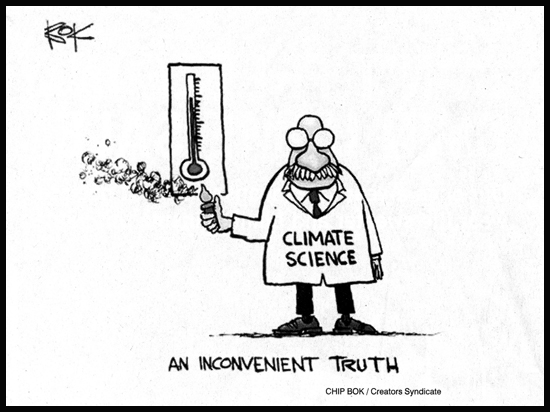Last week a study in the American Sociological Review by Gordon Gauchat claims there has been, in the past four decades, a dramatic decline in churchgoers’ faith in science since around 1970. Sociology as a science is notoriously soft, lacking in rigor, and has produced such failed ideas as eugenics. Be that as it may it does offer insight.

The modern scientific method was fundamentally codified by religious men (mostly Christians) in order to better understand God’s creation. Ever hear of the phrase “doubting Thomas?” It was coined because of nature of the disciple Thomas. Skepticism is definitely a Christian trait.
Consider Anthropogenic Global Warming (AGW), now renamed Climate Change. Over the past four decades, scientists have told us to prepare for an upcoming ice age and warned of catastrophic global warming. Many scientists and government types trying to use scares of dramatic climate change as a means to institute tyrannical government controls on the everyday lives of the average person. At the same time scientists like Professor Richard Linden of MIT, and thousands of others clearly say that there is no scientific evidence of man causing harmful climate change.
Mike Hulme is a high-ranking professor at the University of East Anglia who has done substantial work and is influential with the UN Intergovernmental Panel on Climate Change (IPCC). This is of course the same University of East Anglia which is infamous for the Climate-gate emails, where “scientists” were exposed hiding and suppressing data, and colluding against any whose research didn’t support the pre-conceived conclusions that AGW is valid. These emails noted that it was more important to protect the message of AGW than expose the truth revealed by the science.
Professors Hulme explains from the concluding chapter his book, Why We Disagree about Climate Change: Understanding Controversy, Inaction and Opportunity: “The function of climate change I suggest, is not as a lower-case environmental phenomenon to be solved. Solving climate change should not be the focus of our efforts any more than we should be ‘solving’ the idea of human rights or liberal democracy. It really is not about stopping climate chaos. Instead, we need to see how we can use the idea of climate change – the matrix of ecological functions, power relationships, cultural discourses and materials flows that climate change reveals – to rethink how we take forward our political, social, economic and personal projects over the decades to come.”
People looking for honesty and abject truth are now skeptical of the “science” presented by proponents of Global Warming theory. Being caught in lies, and watching complete double standards as to who should and shouldn’t follow new draconian environmental laws have left many skeptical. This is a more common trait in people of faith in America. How dare people of faith, who believe that there is actual truth, be skeptical of scientists who openly claim that the idea of Climate Change being used as a method to achieve political, social, economic, and personal projects is more important than the science and problems to be solved.
This new attitude by scientists like Hulme of demanding the trust of the people without evidence, in the face of them hiding evidence, and in their own words saying the evidence, facts, and science isn’t as important as the political and social goals is a good reason that the religious are skeptic. Any good scientist should be a Doubting Thomas, why is that skepticism from outside the “scientific” community now seen as irrational.
Doubting Thomas is someone who will refuse to believe something without direct, physical, personal evidence; in other words, a skeptic. This phrase is coined based on based on the Biblical story of Christ’s Apostle, Thomas. Thomas, a disciple of Jesus, doubted Jesus' resurrection and demanded to feel Jesus' wounds before being convinced (John 20:24-29). Skepticism has a long tradition in Christianity, more importantly, scientific skepticism is rooted in a methodology for looking at what God crated, a methodology developed by great religious men of the past: The Scientific Method.
Roger Bacon (1214–1294), is credited with first documenting the scientific method, based on the writings of Muslim scientists, he described a repeating cycle of observation, hypothesis, experimentation, and verification. But it is Galileo (1564–1642) who is considered the father of the Scientific Method in modern culture. According to an old 1970 edition of The Encyclopedia Britannica, “Even while Bacon was philosophizing, the true method was being practiced by Galileo, who, with a combination of observation, hypothesis, mathematical deduction and confirmatory experiment founded the science of dynamics.”
Scientists are now asking for unqualified faith in their findings and recommendations, not skepticism facts, and truth. That sounds more like religion than science. Gauchat’s work seems to fly in the face of famous sociologist Robert K. Merton who wrote, “Most institutions demand unqualified faith; but the institution of science makes skepticism a virtue.”





No comments:
Post a Comment